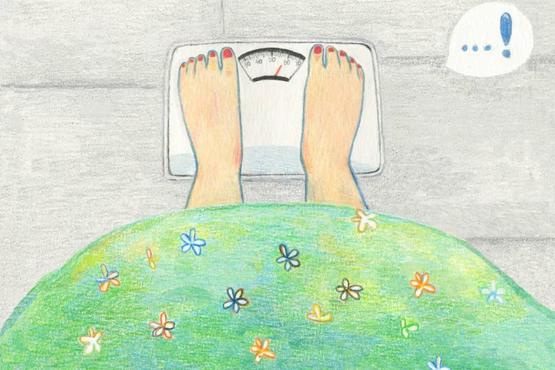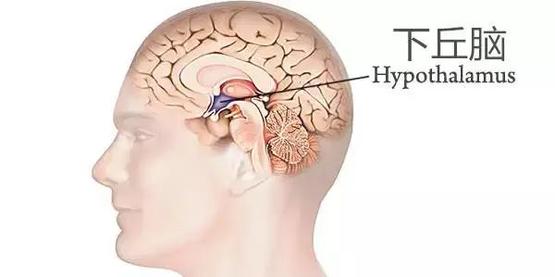
“Eat less” is probably the most popular weight loss regimen ever, bar none. “Open your legs” is too tiring, “shut your mouth” seems easier, just be cruel to yourself. Moreover, the theoretical basis of this program is impeccable – as long as the calories absorbed are less than the calories consumed, and the income is less than the expenditure, weight loss is only a matter of time. It doesn’t matter if you exercise less and consume less, as long as you eat less.
Is it so simple? If so, where are there fat people? The truth is always cold and skinny. If you just want to lose weight by dieting, beware of starving and gaining weight.
Want to keep losing weight by being hungry? It’s really tough
Dieting to lose weight is not as simple as gritting your teeth and being hard on yourself. You can of course be cruel to yourself, but the “income” and “expenditure” of calories are not all under your control. In the long evolutionary process, we have left many trivial “little things” to the brain to handle, such as breathing, heartbeat, and our weight. After a series of knockouts, the surviving brains have all developed a set of weight control skills, monitoring the body’s calorie balance 24/7.
However, the brain’s goal is not to help you stay slim. Its weight management work has only one guiding principle: stability – by regulating the intake and consumption of calories by the body’s organs, the body weight and the body’s adipose tissue are maintained. Skinny is just within the right range. Stability trumps everything! Don’t be so thin that you can’t survive a famine; don’t be so fat that you can’t outrun a lion. So, for most of us, adult weight is relatively stable. Also because our weight is inexplicably stable (especially if we can’t lose it), scientists have done a lot of research on the calorie balance control mechanism in the body.
So what does the brain think we should weigh? It varies from person to person and is related to our physical condition and living environment. Scientists have put forward many theories to find the exact answer, but this is still a bit of a headache so far.
You may have heard of the set -point theory of weight, which was the first hypothesis put forward by scientists after they discovered that our weight is particularly stable. “how much fat” information, so when body weight and body fat content deviate from this set point, the hypothalamus regulates metabolism to push the body back to the original set point.
Scientists rely on it to explain why we can’t lose weight. But soon a new problem arose, and the set point theory couldn’t explain why we keep getting fat more easily. After that, many new theories and hypotheses revised and supplemented the set point, taking environmental factors and genetic differences into account. The good news is that these new theories better explain why we keep getting fat and uncover some coping strategies that work. The bad news is that scientists have basically reached a consensus on whether we can starve ourselves and lose weight since they put forward the set point theory. Disaster.
Although you eat less, your brain allows you to consume less and absorb more efficiently.
The brain has a whole set of self-developed high-tech devices to maintain our weight. A small thing called the “hypothalamus” is the core device used to regulate calorie balance and maintain body weight [7]. The hypothalamus is hidden in the lower part of the brain and above the brain stem. Although it is only the size of an almond, it is an advanced nerve center responsible for regulating the endocrine activities of the body.

Schematic diagram of the location of the hypothalamus | Source: organsothebody.com
In the middle of the last century, scientists discovered that the hypothalamus is a central organ that controls appetite, hunger, and caloric balance. But soon, scientists discovered that the brain does not rely solely on regulating calorie balance to resist dieting. The hypothalamus is not fighting alone. It also affects the senses (sight, smell, taste) and even emotions (like , craving, imagination, memory) other nervous systems. When we willfully starve ourselves into a thin person, and then try to maintain the victory, or even continue to lose weight, these little friends in the brain will use all their skills behind the scenes, both soft and hard, to destroy our weight loss results.
When the weight is starved to near an unacceptable lower limit for the brain, your body “doesn’t need” to eat as much. The brain increases the efficiency of the body’s absorption of heat, which is “open source”.
At the same time, the brain also increases the efficiency of the body’s operation, reducing the amount of calories needed to maintain daily activities, which is “throttling.” The mechanism may be that weight loss leads to hormonal changes, which in turn make the body more inclined to recruit high-efficiency muscle fibers and high-efficiency muscle proteins in fibers. The overall macro effect is that after being hungry and thin, the total energy consumption of muscles is reduced when doing low-intensity exercise.
For example, originally you had to eat three bowls of rice to absorb 300 kcal, but now you may only need two bowls of rice. Work that used to require 300 kcal may now be enough for 200 kcal. Of course, all of this is secretly controlled by the brain behind the scenes, and it won’t let you notice a strange feeling. So you still eat three bowls of rice as before (can absorb 450 kcal of calories now), and do the work that originally required three bowls of rice (but only consumed 200 kcal of calories). As for the brain, the part of the calories saved is silently stored as fat.
How strong is the ability of the brain to open source and reduce expenditure? Scientists have done a lot of experiments to test. In the experiment, scientists cruelly controlled the weight of various small animals and human volunteers through diet, fattening them first, then starving them to thin them, enticing the brain to take action, and then observing the changes in the bodies of the small animals and volunteers in the process . Professor Leibel of Columbia University found in an experiment that when the body weight was reduced by 10% or more through dieting, the daily calorie consumption of obese people decreased by 3-13 kcal/kg of lean body mass (lean body mass is the amount after removing adipose tissue. body weight), people who have never been overweight also reduced their daily caloric expenditure by 3-9 kcal/kg of lean body mass.
That is to say, if you lose weight by eating less, you have to eat less during the “thin” maintenance period than during the weight loss period. Let’s take an example based on the experience of more scientists. Suppose a girl of about 60 kilograms starves to lose 6 kilograms of body weight. When she is going to continue to diet to maintain her weight loss results, her angry brain will force her to reduce her daily weight. Consume about 300-400 kilocalories, which means that this girl, from now on, will have to eat one less bag of potato chips, or two or three less spicy chicken wings, or less every day than when she was hungry and thin. Drinking two or three bottles of beer is only possible to keep the 6 kilograms of victory. otherwise? Of course, the part that was not eaten was turned into flesh and was silently stored.
By the way, the brain also increases the efficiency of using calories to produce fat. So you may also eat less than you used to, but gain weight faster than you used to. Therefore, if you want to stay thin, you must be more cruel to yourself than when you were hungry and thin at the beginning.
Regardless of gender, age, or age, as long as you are hungry and thin, your brain will retaliate equally. There is also a legend that a fat person who is hungry and thin makes his brain even more angry.
You plan to eat less, but your brain is determined to make you hungry and thirsty
What, you say you’re cruel enough to yourself to be willing to eat less and less? Don’t forget that the hypothalamus is not fighting alone, there are parts of the brain that affect the five senses and emotions.
I just said for a long time that it is your “body” that does not need to eat so much, not you. On the contrary, under the powerful “propaganda” offensive of the brain, you are hungry faster, more violently, and more ferociously than before. Especially hungry girls.
Because of hunger, you become restless and scratch your heart; because of hunger, your ability to perceive food becomes more acute; because of hunger, the memories on the tip of your tongue become more vivid one by one; because of hunger, sweetness The nourishing, greasy and greasy things start to make you think, and even the things you don’t like to eat start to become cute; because you are hungry, your appetite increases greatly, and your appetite is widened. You can refuse everything except temptation. From changing one dollar for a big cup to self-service eating, the collapse begins in minutes, but you will not realize the existence of any “danger” at all… All these are under the silent control of the brain.

When dieting, all kinds of high-calorie foods come and go in the brain | Source: prevention.com
Numerous martyrs and the brain’s long-term struggle experience tells us that resistance is useless in the end. No matter how self-willed you are, it only takes about a year for about 50% of the hungry meat to grow back. After 2-5 years, the previous results will be gone, and even about half Will be fatter than when I started losing weight 5 years ago. In other words, if you want to lose weight by dieting, after several years of hard work, it is very likely that you will end up starving and fattening yourself.
When you see this, you may ask: Liar, what you just said was maintaining stability! My brain is so powerful, how come he dragged me back when I didn’t see how long I was eating?
Why is it easier to eat fat? The brain just prefers your rounded look
Simply because most of the days our brains have spent with us over the course of hundreds of thousands of years of evolution is just too hard.
In the hundreds of thousands of years since I took over the job of taking care of our weight, the brain has rarely been bothered by the fact that “Little Master, you are too fat, it’s time to lose weight.” The problem that has always been a headache for him is that there is always not enough food to eat, and the little masters are accidentally starved to death.
For most of us, complete food and clothing is only a matter of the last one or two hundred years, or even decades. What you can’t eat now can be stored in the refrigerator for tomorrow, but in those long years of starvation, it’s safer to eat as much food as possible and turn it into fat to stick to your body food security strategy. This is true for humans, and the same is true for animals.
Animals have multiple things to worry about – eating too much fat is likely to turn into fat and stick to other people’s stomachs. We humans don’t have to worry about this, with swords, spears, swords, halberds, axes and forks, 18 kinds of weapons, 72 unique skills, and fireworks and firecrackers are not afraid of year-round beasts, are you still worried about these little game? In a long-term famine environment, the threat from natural enemies is not large enough. This unique survival selection pressure of human beings makes our body more inclined to retain genes and physiological regulation mechanisms that are conducive to storing heat.
A happy life without natural enemies for too long not only makes the brain slowly become rusty in the technology of controlling our weight limit, but even produces the strange idea of ”you humans are obviously fatter, the better” . Take “Leptin” as an example. As a pheromone used by the brain to monitor fat reserves, leptin itself can indeed suppress appetite, increase energy consumption, and inhibit fat synthesis to prevent obesity (so called leptin). ). In humans, however, it only acts as a powerful regulator when weight loss causes leptin levels to drop, ruthlessly pulling weight back to normal. And when the weight increases and the level of leptin increases, it is far less effective in preventing us from getting fat than when it is thin. In other words, after a long period of evolutionary selection, our brains now only care if you’re too hungry to be thin. As for whether it will eat into a fat man, it is not so interested.
Therefore, the cruel reality is that the aforementioned range of “not fat or thin” will continue to increase with the steady increase in weight. That is to say, under the rule of the brain, it is difficult for you to keep starving to be thin, but you can keep eating to be fat . What’s more cruel is that the environment we live in now, whether it is convenient and fast catering services, or the living habit of sitting and sleeping during the day and night, is a happy paradise that destroys your dieting achievements in minutes and increases your fat reserves. Of course, the brains are happy about this – no longer have to worry about starving you to death.
All in all, fast weight loss by starvation in the short term is not the right way to fight with the brain, and the end result is likely to be “fatigue and fattening”. “Keep your mouth shut” also needs to be scientific. On the premise of balancing the dietary structure and meeting nutrient needs, slowly reduce to a target weight that suits you at a rate of about 1 kg per week , and let the brain and body gradually adapt together. May maintain long-term slimness and health.
Author: Water Aries
Edit: You Shiyou
This article is from Nutshell and may not be reproduced without authorization.
If necessary, please contact [email protected]

This article is reproduced from: http://www.guokr.com/article/461743/
This site is for inclusion only, and the copyright belongs to the original author.